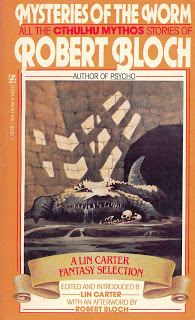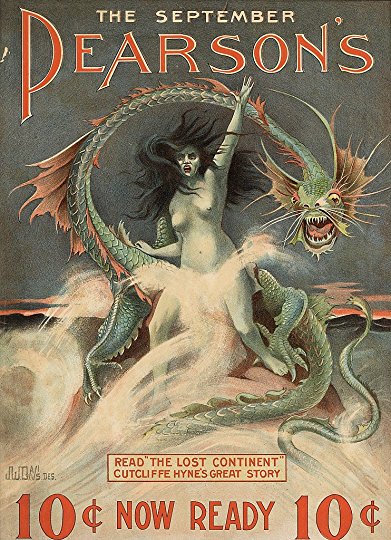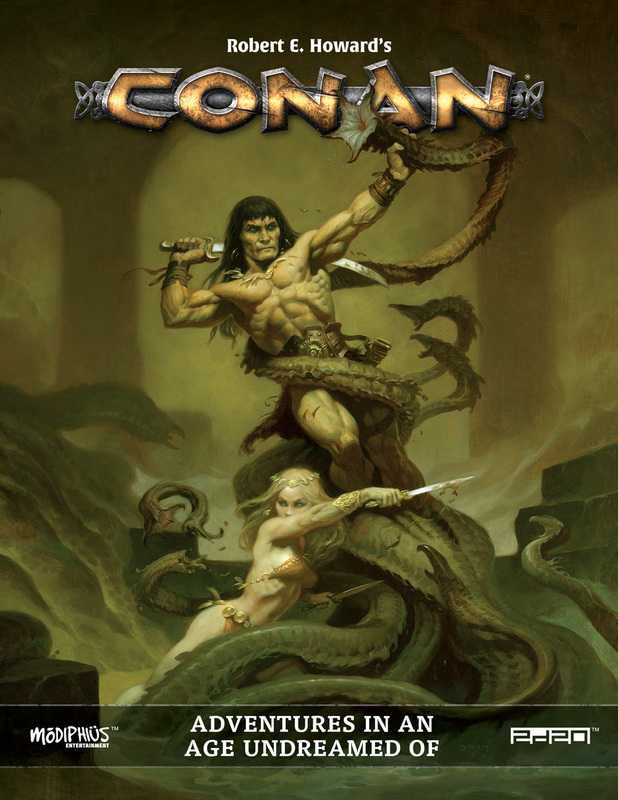Sensor Sweep: Lin Carter, Tolkien, and Modiphius Conan
Monday , 27, November 2017 Sensor Sweep 8 CommentsFiction (Tolkien and Fantasy blog): “The Ballantine Adult Fantasy Series, which published some 70-odd books from 1969-1974, is justly renowned, and Lin Carter (1930-1988) is often acclaimed as the editor of the series, but he was not the editor. Look at the footer of every single one of his introductions  to books in the series: his title is given as “Editorial Consultant, The Ballantine Adult Fantasy Series.” The Editor of the series was actually Betty Ballantine. What titles Carter suggested for the series had to have her approval, and since Carter’s own taste was known to reach pretty low, we can be grateful to Betty Ballantine for holding the reins and keeping the standards higher.”
to books in the series: his title is given as “Editorial Consultant, The Ballantine Adult Fantasy Series.” The Editor of the series was actually Betty Ballantine. What titles Carter suggested for the series had to have her approval, and since Carter’s own taste was known to reach pretty low, we can be grateful to Betty Ballantine for holding the reins and keeping the standards higher.”
Gaming (Pulsipher Game Design): “I make games that are models of something, or are “pure” abstract games, that is, games that are very simple in conception. But there is an opposite philosophy of making a puzzle-like game more complex so that the puzzle is harder to solve. Simplification is quite a different matter in that situation, and something I can’t address specifically both because it’s the opposite of my philosophy and because I dislike that kind of so-called ‘game’.”
Fiction (American Conservative): “In the 20th century, as noted above, the greatest expression of a proper romanticism can be found in the works of Tolkien as well as in the works of the other Inklings, C.S. Lewis, Owen Barfield, and Lord David Cecil. In terms of sales and influence, however, Tolkien has far exceeded that of his closest friends. For almost anyone under the age of 70, Tolkien is a champion of great art and high imagination. For an older generation—in general—he still, unfortunately, represents decadent hippiness, magic mushrooms, and psychedelic tuning out.”
Media (Bradford Walker Blog): “With the bad news about Justice League coming out over the weekend (taking in only $94M when it needed twice that to have a shot at breaking even, and needing to hit $1B domestic to be profitable), you know it’s going to mean bad reactions from all of the trustworthy folks. Midnight’s Edge had their say the other day. Today it’s time for the World Class Bullshitters.”
have a shot at breaking even, and needing to hit $1B domestic to be profitable), you know it’s going to mean bad reactions from all of the trustworthy folks. Midnight’s Edge had their say the other day. Today it’s time for the World Class Bullshitters.”
Fiction (The Weekly Standard): “In 1882, a Minnesota writer and politician named Ignatius Donnelly published Atlantis: The Antediluvian World, perhaps the most popular work of pseudo-science of the 19th century. Its opening pages confidently set forth 13 propositions about the legendary island kingdom—notably that Atlantis was real, that it was an advanced civilization with colonies in ancient Egypt and South America, and that it invented the alphabet and writing, practiced monotheistic sun-worship, and possessed sophisticated scientific know-how. Regrettably, as Donnelly wrote, ‘Atlantis perished in a terrible convulsion of nature, in which the whole island sunk into the ocean, with nearly all its inhabitants.’ “
Gaming (Tales to Astound): “The ‘Edge of Night’ sector includes over 400 star systems and marks the furthest spinward expansion of humanity from The Earth Before. The name refers to “The Night”; a vast of rift of dust and gas, devoid of star systems, and much too wide to cross with existing jump technology. No one knows what lies beyond ‘The Night’; likewise, many of the sectors’ inhabited systems are largely unknown to those in more civilized space.”
Gaming (Modiphius): “London 14 Nov 2017: Modiphius Entertainment is pleased to announce a fresh set of releases from its Conan: Adventures in an Age Undreamed Of RPG, with a Gamesmaster Screen, four exciting tile sets, a double poster map and the limited edition Conqueror’s Bag, a wealth of goodies to fuel gamers’ adventures in the Hyborian Age.
The Conan Gamesmaster’s Screen & GM’s toolkit is available for the first time in physical form, and features a sturdy four-panel build has four portrait-oriented panels, contains all of the useful tables and charts from the core rulebook, as well as rules summaries for quick reference. May also double as a shield from arrows, thrown  tankards or ale horns, and even hatchets!”
tankards or ale horns, and even hatchets!”
Fiction (DMR Books): “As with most things, I find myself being exposed to the classics late in life, rather than during my formative years where most people seem to encounter them. As such, I’ve never read Jack Vance until now, “The Dying Earth” being my first. I was immediately enthralled by this collection of loosely-related short stories set in the distant future when our civilization is but a forgotten memory, machinery has been replaced by sorcery, and the sun is on the verge of being extinguished.
The stories in “The Dying Earth” are based on fantasy concepts that have become familiar to most of us over the decades, and yet here, they remain fresh. Plot devices that have become somewhat trite over the years are implemented in such a way that it feels like the first time I’m encountering them. This makes for a very thoughtful and enjoyable read that never fails to spark imagination. This is all well and good, but it takes more than just imagination for me to finish a book. “The Dying Earth” is unique because of the nature of the ambition of Vance’s characters, made evident in three ways:
- Unabashed self-interest
2. Ongoing pursuit for perfection
3. Determination to find independence from the collective.”
I’m waiting for Modiphius to get off their butts and get the John Carter games going. At this rate, Savage Worlds Flash Gordon will be out first.
A Few Things
On Tolkien & Fantasy:
1) “…Romanticism successfully saved Christianity from the utilitarianism and rationalism of the 18th century…” I don’t believe it since Odinism and Aryanism were Romantic Movements yet they are nothing but Fringe Groups now.
2) “…lovers of Romantic literature should avoid: Philip Pullman, Michael Moorcock, and Stephen Donaldson…” Who? I genuinely have never heard of these authors before. Can anyone elaborate?
On The Weekly Standard
Is “The Lost Continent” considered Red Science Fiction or Blue Science Fiction? Still trying to figure out the difference between the two though the book doesn’t sound like Pink Science Fiction.
-
2) Philip Pullman’s THE GOLDEN COMPASS and its sequels are described by the author as an attempt at an atheist anti-Narnia.
Michael Moorcock is best known for Elric of Melnibone, an anti-Conan–a sickly albino from a decadent culture, wielding a soul-drinking magical sword–but most of his other stories seem to be similarly wholesome.
Stephen Donaldson is best known for Thomas Covenant the Unbeliever, whose story is to complicated to sum up here. He (the author) may not be anti-Romantic himself, but his stories can be mighty grimdark.
3) From the description, it sounds pretty Blue. Lots of action and adventure; and the social commentary serves the story, not the other way round.
-
And it occurs tell me that I may have reversed the colors. I have never gotten over the media’s red-state/blue-state obfuscation…
-
The Chronicles of Thomas Covenant is a tale of redemption not to be missed. The darkness only makes the manifest beauty shine all the brighter.
The first two Pullman Dark Materials books are okay, just stop there and make up your own conclusion.
-
Correction: I have heard of The Golden Compass and Philip Pullman, I just keep forgetting his name and have no interest in reading The Dark Materials Trilogy.
-
“What titles Carter suggested for the series had to have her approval, and since Carter’s own taste was known to reach pretty low, we can be grateful to Betty Ballantine for holding the reins and keeping the standards higher.”
The same Betty Ballantine who told Evangeline Walton to write a LotR clone or go home? The same Betty Ballantine who found Terry Brooks to do just that? If people want to look for editors/publishers who set up the SFF shift/convergence/whatever of 1980, they need to take a hard look at the Ballantines and also Terry Carr over at Ace during the ’60s.
I can’t believe Anderson threw Carter under the bus like that.
“The same Betty Ballantine who told Evangeline Walton to write a LotR clone or go home?”
Never happened.
“The same Betty Ballantine who found Terry Brooks to do just that?”
Terry Brooks was accepted and promoted by Lester del Rey, after Ian and Betty Ballantine left the firm they had founded.
“I can’t believe Anderson threw Carter under the bus like that.”
If you look at the facts, I’ve done nothing of the sort. I don’t mind being criticized when I’m wrong, but this is ridiculous.